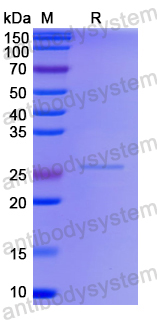Catalog No.
YHK68101
Expression system
E. coli
Species
Homo sapiens (Human)
Protein length
Leu20-Gly226
Predicted molecular weight
26.03 kDa
Nature
Recombinant
Endotoxin level
Please contact with the lab for this information.
Purity
>90% as determined by SDS-PAGE.
Accession
Q8WUX9
Applications
ELISA, Immunogen, SDS-PAGE, WB, Bioactivity testing in progress
Form
Lyophilized
Storage buffer
Lyophilized from a solution in PBS pH 7.4, 0.02% NLS, 1mM EDTA, 4% Trehalose, 1% Mannitol.
Reconstitution
Reconstitute in sterile water for a stock solution. A copy of datasheet will be provided with the products, please refer to it for details.
Shipping
In general, proteins are provided as lyophilized powder/frozen liquid. They are shipped out with dry ice/blue ice unless customers require otherwise.
Stability and Storage
Use a manual defrost freezer and avoid repeated freeze thaw cycles. Store at 2 to 8°C for frequent use. Store at -20 to -80°C for twelve months from the date of receipt.
Alternative Names
Chromatin-modifying protein 7, Charged multivesicular body protein 7, CHMP7
Classical swine fever virus recruits ALIX and ESCRT-III to facilitate viral budding., PMID:39998268
Nuclear ESCRT is involved in intranuclear protein quality control by micronucleophagy., PMID:39721364
CHMP2B promotes CHMP7 mediated nuclear pore complex injury in sporadic ALS., PMID:39709457
Divergent and Convergent TMEM106B Pathology in Murine Models of Neurodegeneration and Human Disease., PMID:39606446
Inhibition of RNA splicing triggers CHMP7 nuclear entry, impacting TDP-43 function and leading to the onset of ALS cellular phenotypes., PMID:39486415
A new microscopy pipeline for studying the initial stages of nuclear and micronuclear rupture and repair., PMID:39359718
Micronuclear collapse from oxidative damage., PMID:39208110
Necroptosis pathway emerged as potential diagnosis markers in spinal cord injury., PMID:38509743
Nuclear pore dysfunction and disease: a complex opportunity., PMID:38383349
Relevance of pyroptosis-associated genes in nasopharyngeal carcinoma diagnosis and subtype classification., PMID:38282154
Highly variable molecular signatures of TDP-43 loss of function are associated with nuclear pore complex injury in a population study of sporadic ALS patient iPSNs., PMID:38168312
Nuclear envelope assembly relies on CHMP-7 in the absence of BAF-LEM-mediated hole closure., PMID:37795681
An ESCRT grommet cooperates with a diffusion barrier to maintain nuclear integrity., PMID:37783794
SUN1 facilitates CHMP7 nuclear influx and injury cascades in sporadic amyotrophic lateral sclerosis., PMID:37639327
Nuclear envelope assembly relies on CHMP-7 in the absence of BAF-LEM-mediated hole closure., PMID:37461528
The influence of pyroptosis-related genes on the development of chronic obstructive pulmonary disease., PMID:37194062
DNA methylation signature aberration as potential biomarkers in treatment-resistant schizophrenia: Constructing a methylation risk score using a machine learning method., PMID:36442407
Development of a prognostic prediction model based on a combined multi-omics analysis of head and neck squamous cell carcinoma cell pyroptosis-related genes., PMID:36246601
Genomic analysis of the endosomal sorting required for transport complex III pathway genes as therapeutic and prognostic biomarkers for endometrial carcinoma., PMID:36237250
Disruption of nuclear envelope integrity as a possible initiating event in tauopathies., PMID:36001963
Oligomeric CHMP7 mediates three-way ER junctions and ER-mitochondria interactions., PMID:35962186
Nuclear pore complexes - a doorway to neural injury in neurodegeneration., PMID:35488039
Dictyostelium spastin is involved in nuclear envelope dynamics during semi-closed mitosis., PMID:35298348
Emerging Connections between Nuclear Pore Complex Homeostasis and ALS., PMID:35163252
Cellular ESCRT components are recruited to regulate the endocytic trafficking and RNA replication compartment assembly during classical swine fever virus infection., PMID:35120190
The ESCRT machinery directs quality control over inner nuclear membrane architecture., PMID:35045304
Multidimensional Analysis of the Role of Charged Multivesicular Body Protein 7 in Pan-Cancer., PMID:34785938
Unexpected organellar locations of ESCRT machinery in Giardia intestinalis and complex evolutionary dynamics spanning the transition to parasitism in the lineage Fornicata., PMID:34446013
Nuclear accumulation of CHMP7 initiates nuclear pore complex injury and subsequent TDP-43 dysfunction in sporadic and familial ALS., PMID:34321318
CDK1 controls CHMP7-dependent nuclear envelope reformation., PMID:34286694
The ESCRT-III protein VPS4, but not CHMP4B or CHMP2B, is pathologically increased in familial and sporadic ALS neuronal nuclei., PMID:34281622
The pattern of gene copy number alteration (CNAs) in hepatocellular carcinoma: an in silico analysis., PMID:34215297
Functional validation of CHMP7 as an ADHD risk gene., PMID:33159045
Unrestrained ESCRT-III drives micronuclear catastrophe and chromosome fragmentation., PMID:32601372
LEM2 phase separation promotes ESCRT-mediated nuclear envelope reformation., PMID:32494070
Regulated lipid synthesis and LEM2/CHMP7 jointly control nuclear envelope closure., PMID:32271860
Factors promoting nuclear envelope assembly independent of the canonical ESCRT pathway., PMID:32243490
CHMPions of repair: Emerging perspectives on sensing and repairing the nuclear envelope barrier., PMID:32105978
An ESCRT-LEM protein surveillance system is poised to directly monitor the nuclear envelope and nuclear transport system., PMID:30942170
Gene expression analysis reveals early dysregulation of disease pathways and links Chmp7 to pathogenesis of spinal and bulbar muscular atrophy., PMID:30837566
CC2D1B Coordinates ESCRT-III Activity during the Mitotic Reformation of the Nuclear Envelope., PMID:30513301
Automated analysis of cell migration and nuclear envelope rupture in confined environments., PMID:29649271
LEM2 recruits CHMP7 for ESCRT-mediated nuclear envelope closure in fission yeast and human cells., PMID:28242692
Membrane Binding by CHMP7 Coordinates ESCRT-III-Dependent Nuclear Envelope Reformation., PMID:27618263
Overexpression of CHMP7 from rapeseed and Arabidopsis causes dwarfism and premature senescence in Arabidopsis., PMID:27497741
Evidence for a Nonendosomal Function of the Saccharomyces cerevisiae ESCRT-III-Like Protein Chm7., PMID:26510789
Spastin and ESCRT-III coordinate mitotic spindle disassembly and nuclear envelope sealing., PMID:26040712
Innate immunity and non-Hodgkin's lymphoma (NHL) related genes in a nested case-control study for gastric cancer risk., PMID:23028900
The MIT domain of UBPY constitutes a CHMP binding and endosomal localization signal required for efficient epidermal growth factor receptor degradation., PMID:17711858
CHMP7, a novel ESCRT-III-related protein, associates with CHMP4b and functions in the endosomal sorting pathway., PMID:16856878

